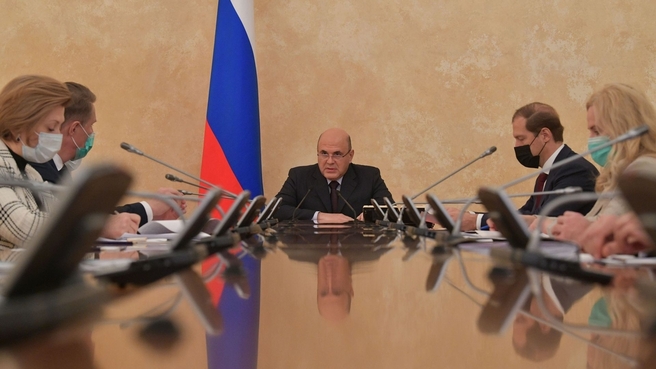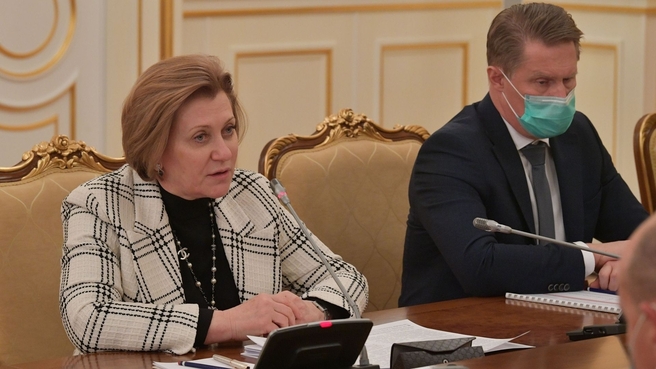Mikhail Mishustin: “We are opening the first vaccination stations. In December, the Federation’s constituent entities will receive 480,000 vaccine doses. I would like to ask the regional authorities to see to it that vaccination stations are open during the New Year holidays, between 1 and 10 January, so that anybody who wants to can be vaccinated.”
Mikhail Mishustin’s opening remarks
Excerpts from the transcript:
Mikhail Mishustin: Good afternoon, colleagues.
Last week, the President instructed us to organise a coronavirus vaccination plan throughout the country starting at the end of this week. I would like to remind everyone that vaccination must be voluntary and absolutely free.
Today I can tell you that we can meet the deadline. The first batches of the vaccine have been sent to the regions, and we are gradually increasing production capacity to the planned level. In December, the regions will receive about half a million vaccine doses, or more precisely, 480,000 doses, according to the information which the producers have confirmed today. The Health Ministry has approved a schedule for the distribution of the vaccine around the country.
The first vaccination stations are opening. A number has been approved for each region and will go up as we increase the vaccine supply. I would like to ask the regional authorities to see to it that vaccination stations are open during the New Year holidays, between 1 and 10 January, so that anybody who wants to can be vaccinated.
In accordance with the President’s instructions, this possibility must be ensured first for teachers and the staff of medical and social facilities, those who are on the medical frontline, so to say. Since the situation varies in different regions, local authorities can expand the list when they are ready to increase the number of vaccinations. I would like to point out that the heads of the constituent entities of the Federation, the governors, must personally monitor the organising of the vaccination process.
More welcome news is the start of post-clinical trials for the new vaccine made at Rospotrebnadzor’s Vektor Centre. The results of these trials will be reviewed in January, and the large-scale use of the vaccine for inoculation will begin in January as well.
However, it can already be said that Russia is among the world’s leaders when it comes to launching a vaccination campaign. We are proud of our researchers and doctors, who have made these achievements possible.
Let us talk in detail about the developments in the regions and whether all parties – the vaccine producers and medical facilities – are ready to start the process.
I am giving the floor to Anna Popova.
Anna Popova: Mr Mishustin, conference participants,
Mr Prime Minister, as you have said, the vaccine made at the Vektor Centre is being released to the general public: it has entered the third, post-registration stage of clinical trials. This vaccine is called EpiVacCorona. Three thousand volunteers will get the vaccination at eight medical centres in five regions. All of them will be issued special instructions to remind them of what they should and should not do after vaccination. These instructions include answers to the most frequently asked questions about vaccination and a recommendation to reduce personal contacts to a minimum until the body develops an immunity response. Those who have received the vaccination today are not yet protected; they must continue to take care and protect themselves from the infection until they develop an immunity response. The instructions also mention that you need to take a special test to determine the level of immunity response; the test was registered yesterday, and test kits will be sent to the regions today so they can objectively determine the effect of the vaccination.
This vaccine is being manufactured at the Vektor facilities, and the first three batches have been already sent to certain Russian regions, namely, Moscow, St Petersburg, Rostov-on-Don, Tula and Novosibirsk. These regions were chosen because the epidemic is especially severe in the Rostov, Tula and Novosibirsk regions beyond their administrative centres, where the provision of medical assistance is being hampered by the shortage of medical personnel. We believe that vaccination should begin in the districts where there is only one paramedic and one teacher, or several teachers, who must be vaccinated to be able to continue providing medical assistance and education services to the people.
Vaccines can be delivered to any part of Russia, even to the most distant villages. The vaccine’s storage temperature is between +2 and +8 Celsius, so we can use the available refrigerated chain to deliver the vaccine and take care of the logistics processes.
Of course, since it is vital to inoculate medical personnel and the Rospotrebnadzor staff, this vaccine is designed primarily for such cases when it comes to the amount of vaccine doses being delivered to the regions and to the most distant parts of the country.
The provision of the vaccine to the general public will increase consistently every week. With this goal in mind, Vektor is negotiating with several pharmaceutical companies to increase the number of vaccine doses exponentially.
Vektor is also conducting independent post-registration clinical trials to determine if the vaccine elicits immunity responses in people over 60. The first volunteers have received it. All of them are feeling well. They are in a higher risk group, and it is extremely important for us to know that the vaccine can be as safe and effective for these people as it has been for other groups.
I would also like to add that the epidemiological situation remains tense in the country, and vaccination is a way and means to stop the spread of the virus, which can help us keep the situation under control. This is why it is so important to ensure that the largest possible number of people in Russia get a safe and effective Russian vaccine.
Mikhail Mishustin: Thank you.
<…>














